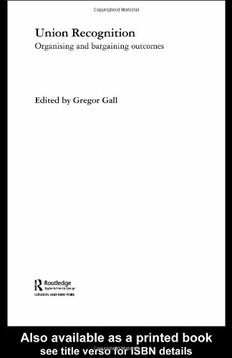
Union Recognition: Organising and Bargaining Outcomes (Routledge Research in Employment Relations) PDF
279 Pages·2005·1.026 MB·English
Most books are stored in the elastic cloud where traffic is expensive. For this reason, we have a limit on daily download.
Preview Union Recognition: Organising and Bargaining Outcomes (Routledge Research in Employment Relations)
Description:
Several thousand new trade union recognition agreements have been signed since 1997, representing a major development within industrial relations in Britain. This has resulted from the interaction of union organizing efforts and the statutory union recognition provisions of the Employment Relations Act 1999. However for trade unions, recognition alone is not enough, a vital issue is whether, having gained union recognition, trade unions are now effectively delivering upon the promises and prospects of union recognition. These essays examine the substantive outcomes of these new agreements in regard to union representation and collective bargaining. In particular, they explore: the impact on terms and conditions of employment employers’ behaviour and strategy the nature of the union-management bargaining relationship the building of workplace unionism. While the collection focuses primarily on Britain, the germane issues are also looked at in the context of Australia, Canada and the U.S.A. Conceptually and theoretically, Union Recognition offers contributions which develop our understanding of the relationship between workplace and national unionisms and of mobilization theory.
See more
The list of books you might like
Most books are stored in the elastic cloud where traffic is expensive. For this reason, we have a limit on daily download.
